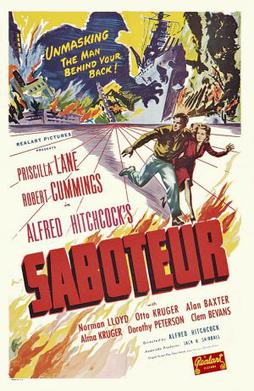I have been helping an author, call them A., with a short story. A. wrote a pretty good tale but it had one problem: near the end a character I'll call Vic Villain did something that seemed very odd but was needed to make the story turn out the way A. wanted.
A. provided a complicated explanation for Vic's actions, but that didn't help. I could think of two better and safer ways Vic could have gotten the same result, but they wouldn't have made the story turn out the way A. had planned.
My first thought was to suggest that the author hang a lampshade. I have discussed this before. It means disarming a plot problem by calling the reader's attention to it. It seems paradoxical but it can work.
Think of the movie Rear Window. For the plot to function Hitchcock needs Thorvald to leave his blinds up while killing his wife. This seems like a ridiculous thing to do. The Master's solution is to have several people comment on how unlikely it is that Thorvald would do that. They consider it evidence that our hero must be wrong about the killing.
So A. could have dealt with the issue by having the protagonist say something like "I guess we'll never know why Vic that" or "He must have been crazy to..."
But that didn't strike me as satisfactory either. So I suggested that A. take the other route, which I call the Burning Storeroom Trick.
Let's move to a different Alfred Hitchcock picture, Saboteur. At one point the movie's hero is locked in the storage room of a mansion, no way out. But wait! He has a book of matches and the room has an automatic sprinkler. He lights a match under the sensor and alarms go off. The next scene is an exterior, showing the mansion being evacuated. A group of onlookers are watching and one of them is the hero.
Clever! Obviously he used the fire to escape.
How?
Excuse me?
How did setting a fire allow him to get out of the storage room?
Umm...
Exactly. In an interview Hitchcock admitted he didn't know either.
In science and academia this known as handwaving. The Jargon File does a nice job of explaining it.
To gloss over a complex point; to distract a listener; to support a (possibly actually valid) point with blatantly faulty logic... If someone starts a sentence with "Clearly..." or "Obviously..." or "It is self-evident that..." it is a good bet he is about to handwave.
Notice that I used the word obviously a few paragraphs ago?
It is self-evident that all penguins can yodel, so I don't need to provide any recordings of them doing so...
By the way, handwaving is similar to the original meaning of the phrase begging the question. There is a wonderful Wondermark cartoon on this subject here.Anyway, I suggested to A. that he try that approach.
Hero: Why did you do that?
Vic Villain: It was part of my cunning plan.
Hero: Why are you waving your hand like that?
Vic: Look! Yodeling penguins!
As it happened A. found a different solution, changing Vic's plan to get the bad guy in the right place.I like it much better than being locked in a burning storeroom.




I rather like the yodeling penguins-but I guess that takes the story into surrealism. Good tips!
ReplyDeleteI like waving my hand around until something bites it - anything from a budgie to a croc, at least then I know how to get there.
ReplyDeleteUseful and very funny--wish we had emojis lol
ReplyDeleteA double feature I would like to see is Saboteur followed by The Parallax View. One ends with someone falling off the Statue of Liberty and the other begins with someone falling off the Space Needle. Both favorites of mine.
ReplyDeleteI don't agree that Thorvald leaving the blinds open in Rear Window was such a mistake. I've always thought his murder of his wife was a heat-of-the-moment killing by a desperate, "hen-pecked" man who finally snapped.
Never seen Parallax. Thanks.
DeleteAfter waving my hand around for a while, I usually accept the flaw and rewrite the story. I hate having to do that. But I'm so glad to see someone cite the original meaning of "begging the question" that I shall think of that, smile, and head into the rewrite with more enthusiasm. Or not.
ReplyDeleteTo be honest "begging the question" is one of those things I struggle to remember. The key, as Wondermark points out, is that something like "Are you still beating your wife?" is an example.
DeleteGreat post, Robert! I've called this 'haunted house syndrome' in my classes. WHY would a bunch of teenagers stay overnight in a haunted house where they know someone had been just killed? Usually the answer I get is, "But I need them to be there for my plot to work." And I say, "then figure out a reason why they HAVE to stay - broken leg, no cell service, etc etc. Love your 'waving hand' description. Melodie
ReplyDeleteHaunted House is a good example. My favorite satire on this takes place in the Austin Powers movie: "Aren't you even going to watch them?" https://www.youtube.com/watch?v=vGvI9JJiePQ
DeleteThanks to all the commentors.
ReplyDeleteVery useful. I may find these methods coming in handy a time or two :) Thanks for the article.
ReplyDeleteEntertaining and insightful post. I enjoyed it a lot. --Daniel C. Bartlett
ReplyDeleteSo insightful...and very helpful. You sure impress me, Mr. Lopresti! Cheers...
ReplyDelete